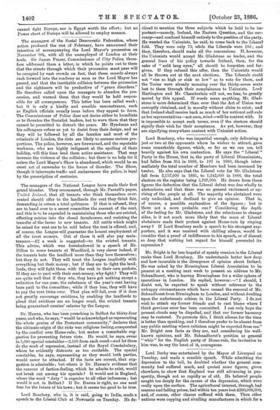Lord Rosebery, who was impartial enough, only delivering a. jest
or two at the opponents whom he wishes to attract, gave, some remarkable figures, which, so far as we can see, tell heavily against his own contention. He says the " Liberal " Party in the House, that is, the party of Liberal Disnnionists, had fallen from 354 in 1880, to 196 in 1886, though inter- mediately the total number of Members had been increased by- twelve. He also says that the Liberal vote for Mr. Gladstone fell from 2,157,000 in 1885, to 1,242,000 in 1886, the total electors on the register being 5,707,000. He draws from these figures the deduction that the Liberal defeat was due wholly to abstentions, and that there was no general excitement or up- rising of the people at alL The majority who abstained were only undecided, and declined to give an opinion. That is, of course, a possible explanation of the figures ; but is there not a more probable one P Considering the depth of the feeling for Mr. Gladstone, and the reluctance to change sides, is it not much more likely that the mass of Liberal abstainers made their protest against Home-rule by staying away ? If Lord Rosebery made a speech to his strongest sup- porters, and it was received with chilling silence, would he consider that a proof of indifference to his speech, or of dissent so deep that nothing but regard for himself prevented its expression P


































 Previous page
Previous page